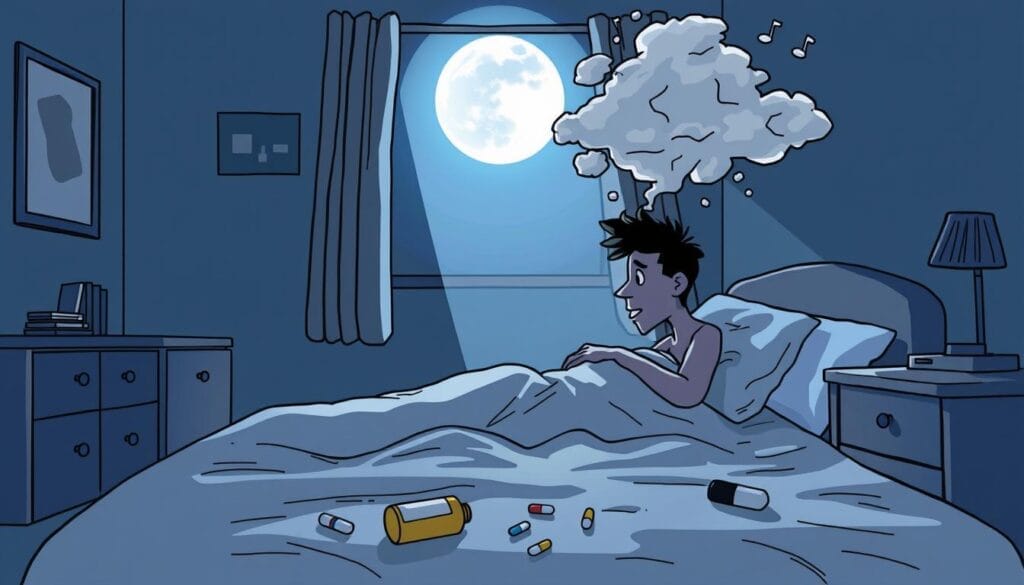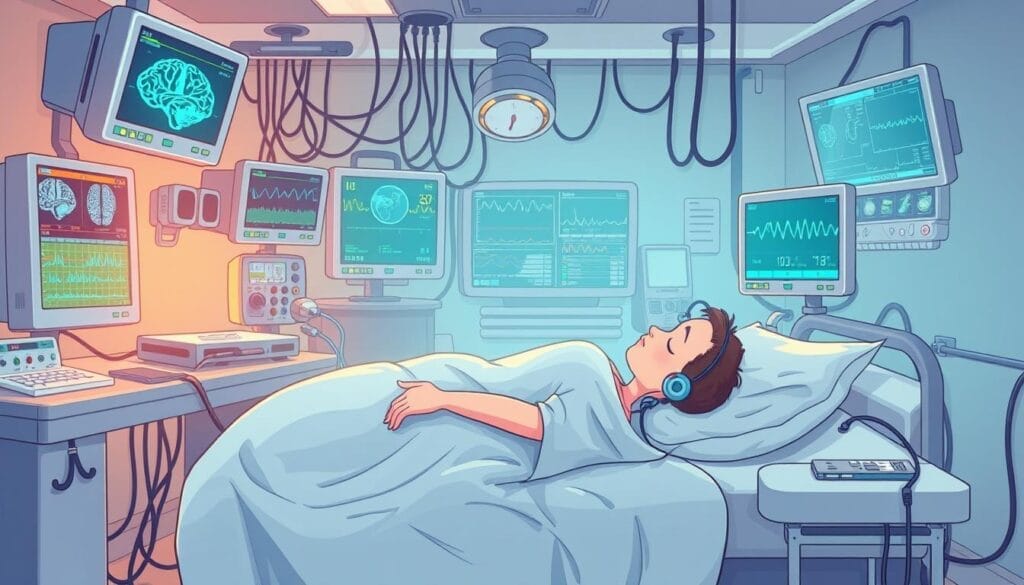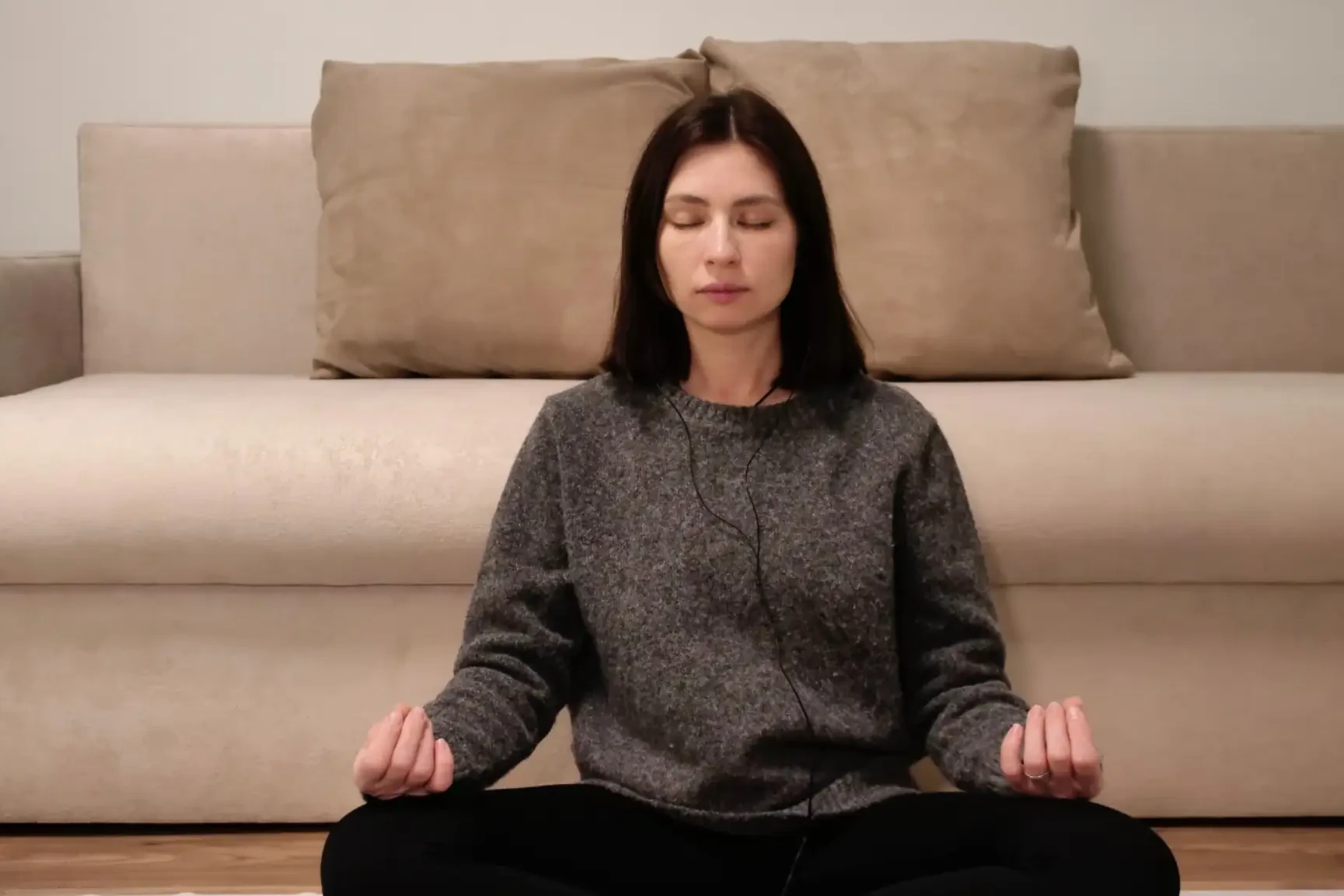Sleep disorders are common in people with neurological conditions. They affect up to 30% of this group. These issues can really hurt their quality of life and health.
Getting the right diagnosis and treatment is key. It helps avoid other health problems and improves their current conditions. Doctors from different fields work together to manage these sleep issues.
Treatments include therapy, medicines, and changes in lifestyle. Even physical therapy can help.
People with brain injuries, strokes, Parkinson’s, and Alzheimer’s often have sleep problems. These issues can make their symptoms worse. They can also hurt their mood and overall health.
Knowing the causes, symptoms, and treatments is important. It helps manage sleep disorders in this group better.
Table of Contents
ToggleUnderstanding Sleep Disorders in Neurological Patients
Sleep disorders are common in people with neurological conditions. They can make a patient’s health worse. This can lead to more problems like heart disease, diabetes, and depression.
Definition of Sleep Disorders
Sleep disorders are many issues that mess up sleep. They are split into six main types. These include insomnia, sleep apnea, and restless leg syndrome.
Types of Sleep Disorders
Neurological patients often face insomnia, sleep apnea, and restless leg syndrome. Insomnia makes it hard to fall or stay asleep. It affects 6% of people in Western countries.
Sleep apnea is when you stop breathing while sleeping. It hits 13% of men and 6% of women between 30 and 70. Restless leg syndrome also messes with sleep and health.
Impact on Neurological Health
Sleep disorders can really hurt neurological health. Insomnia can lower quality of life and increase heart disease risk. Sleep apnea and circadian rhythm disorders can make symptoms worse.
Common Symptoms of Sleep Disorders
Sleep disorders can really hurt your brain health. They cause many bad symptoms that make things worse. The top three sleep disorders are insomnia, sleep apnea, and restless legs syndrome.
Insomnia
Insomnia makes it hard to fall or stay asleep. It affects about 6% of people in Western countries. For those with brain problems, it can make healing harder.
Sleep Apnea
Sleep apnea means you stop breathing while sleeping. It’s common in stroke survivors. It raises the chance of more brain problems. So, it’s key to manage it well.
Restless Legs Syndrome
Restless Legs Syndrome makes you want to move your legs a lot. It’s hard to start sleeping. It’s tough for people with brain issues because it makes symptoms worse.
Doctors can help by fixing these sleep problems. They use things like therapy for insomnia and tips for better sleep. They also work on the brain problems.

Underlying Neurological Conditions Linked to Sleep Disorders
Sleep disorders are closely tied to many neurological conditions. This creates a complex mix of symptoms and sleep problems. Parkinson’s disease, Alzheimer’s disease, and multiple sclerosis are three examples. They often come with sleep-related issues.
Parkinson’s Disease
Parkinson’s disease patients often feel very sleepy during the day. This is due to changes in sleep patterns and the effects of certain drugs. It also disrupts their nighttime sleep. The Parkinson’s sleep issues greatly affect their quality of life.
Alzheimer’s Disease
Alzheimer’s disease patients often have trouble sleeping, known as Alzheimer’s and insomnia. This can lead to cognitive decline and behavioral problems. Their sleep troubles may stem from the disease’s neurological changes.
Multiple Sclerosis
People with multiple sclerosis often feel very tired and sleepy during the day. This can make everyday tasks hard and affect their well-being. The disease’s effects on the brain can mess up their sleep-wake cycle, causing these symptoms.
It’s important to understand how these neurological conditions and sleep disorders are connected. This knowledge helps in finding better ways to manage these issues. It can improve the lives of those affected.
Assessment Tools for Sleep Disorders
Managing sleep disorders in neurological patients needs a full check of their sleep and symptoms. Doctors use many tools to get both facts and feelings. This helps them find the right treatment. Here are some main ways to check sleep disorders:
Sleep Diaries
Sleep diaries are about what a person does at night. They write down bedtime, when they wake up, and how well they slept. Doctors use these to see sleep patterns and find problems.
Polysomnography
Polysomnography, or a sleep study, is the top way to find sleep disorders. It watches many things like brain waves and breathing while you sleep. It shows what’s causing sleep problems, like sleep apnea.
Actigraphy Monitoring
Actigraphy uses a wrist device to track sleep and wake times. It looks at movement to guess how well you slept. It’s good for seeing sleep patterns over time.
Using these tools together helps doctors understand sleep problems better. They can then make plans to help patients sleep better. This improves their life a lot.

Treatment Options for Sleep Disorders
Treating sleep disorders in neurological patients needs a mix of medicines, therapies, and lifestyle changes. Medicines like benzodiazepines and Z-drugs help with insomnia but can lead to addiction. Cognitive Behavioral Therapy for Insomnia (CBT-I) is a top choice for treating insomnia.
Medications
Prescription sleep aids like eszopiclone (Lunesta) and zolpidem tartrate (Ambien) help with sleep. But doctors usually don’t recommend them for long because of risks. Melatonin and natural remedies like valerian might also be tried, but their science backing is weak.
Cognitive Behavioral Therapy for Insomnia (CBT-I)
CBT-I creates a plan to fix sleep problems by changing thoughts and actions. It’s as good as or better than sleep meds, making it a top pick for doctors.
Lifestyle Modifications
Healthy habits can greatly improve sleep. Keeping a regular sleep schedule and staying active are key. Limiting caffeine and alcohol and having a calming bedtime routine also helps. For those with neurological conditions, these tips need to be adjusted to fit their needs.
The Role of Sleep Hygiene
Good sleep hygiene is key for neurological patients to manage sleep disorders. It helps improve health outcomes. A consistent sleep routine, a restful environment, and avoiding stimulants can boost sleep quality and length.
Establishing a Sleep Routine
Having a regular sleep schedule is vital. Going to bed and waking up at the same time every day is important. It helps the body adjust its internal clock for better sleep.
Adding relaxing activities like light reading or gentle stretching to your bedtime routine helps signal to your brain that it’s time to sleep.
Creating a Restful Environment
The sleep environment is crucial for quality sleep. A cool, dark, and quiet bedroom reduces outside distractions. A comfy mattress and pillows, and avoiding screens before bed, also help.
Limiting Stimulants
It’s important to avoid or limit substances that can disrupt sleep. Caffeine, alcohol, and nicotine are stimulants that can make falling asleep hard. Alcohol might help you fall asleep but can wake you up later.
By being careful with these stimulants, neurological patients can sleep better and feel healthier.

Integrating Physical Activity into Sleep Management
Managing sleep disorders in neurological patients can be helped by adding [exercise for better sleep]. Physical therapy for sleep disorders has shown great results. Different exercises, like aerobic, strength training, and flexibility routines, can help improve sleep.
Types of Recommended Exercises
Moderate-intensity aerobic exercise can make sleep better and reduce insomnia and sleep-disordered breathing. Power lifting and active yoga also help by raising heart rate and aiding sleep. It’s important to find what works best for each person.
Timing and Frequency
When you exercise can affect sleep. Studies show that exercising in the afternoon or early evening works best. This lets endorphins drop and the brain relax for sleep. Experts say 30 minutes of moderate exercise can improve sleep quality that night.
Monitoring Progress
- Keeping track of sleep with sleep diaries and actigraphy helps see how exercise affects sleep.
- Tracking sleep quality, duration, and other metrics helps make physical activity more effective for sleep.
Adding physical activity to a sleep plan is a strong tool for neurological patients. Choosing the right exercises, timing, and tracking progress are key. A well-rounded approach can greatly improve sleep quality and overall health.
The Importance of a Multidisciplinary Approach
Managing sleep disorders in neurological patients needs a team effort. A team of healthcare professionals works together. This team approach gives care that meets the complex needs of those with sleep issues linked to neurological conditions.
Collaboration with Neurologists
Neurologists are key in tackling sleep disorders linked to the brain. They understand the brain conditions that affect sleep, like Parkinson’s or Alzheimer’s. Working with neurologists helps healthcare teams create specific treatment plans for each patient.
Role of Psychologists
Psychologists focus on the mental side of sleep problems. They use cognitive behavioral therapy for insomnia (CBT-I) to teach patients good sleep habits. This helps manage the emotional and behavioral factors that cause sleep issues. Psychologists add a vital layer to treating sleep disorders in neurological patients.
Involvement of Sleep Specialists
Sleep specialists, like those in sleep medicine, are vital to the team. They do detailed tests to find out what sleep problems a patient has. They then suggest treatments like CPAP therapy or oral appliances to meet the patient’s sleep needs.
Working together, the team ensures neurological patients get the best interdisciplinary sleep treatment. This team effort, with neurologist consultation and sleep medicine experts, is key for personalized, top-notch care. It greatly improves the health and well-being of these patients.

Challenges in Managing Sleep Disorders
Treating sleep disorders in neurological patients is complex. A big challenge is making sure patients stick to their treatment plans. This is hard for those with cognitive issues.
It’s also tough to tell apart sleep disorders from neurological conditions. Sleep problems can be both symptoms and causes. So, figuring out the main issue is key.
Getting to sleep disorder resources can be hard in some places. This makes getting full care harder. Not having access to sleep experts adds to the problem.
To solve these issues, a team effort is needed. Neurologists, sleep specialists, and others must work together. They need to talk well, share ideas, and understand the patient’s whole situation.
By tackling these problems, doctors can help patients with sleep disorders more. This leads to a better life, fewer symptoms, and better health.
Future Directions in Sleep Disorder Management
Researchers are working hard to understand how sleep disorders and brain health are linked. They are finding new ways to help people with these issues. Sleep disorder research is growing, helping us learn more about what causes them.
New technology is changing how we deal with sleep problems. Things like smart sleep trackers and online doctor visits are making it easier to get help. These tools help doctors and patients work together better.
There’s also a push to teach patients more about their sleep issues. Online health tools, custom plans, and special programs are being made. They aim to make patients feel more in control and help them stick to their treatment plans.
FAQ
What are the most common types of sleep disorders affecting neurological patients?
Neurological patients often face six main sleep disorders. These include insomnias and sleep-related breathing disorders. Also, central disorders of hypersomnolence, parasomnias, sleep-related movement disorders, and circadian rhythm sleep disorders are common.
How do sleep disorders impact the overall health of neurological patients?
Sleep disorders can make neurological symptoms worse. They also harm cognitive function. This can lead to conditions like cardiovascular disease, diabetes, and depression.
What are the typical symptoms of sleep disorders in neurological patients?
Symptoms include trouble starting or staying asleep. Excessive daytime sleepiness is also common. These issues can affect daily life and quality of life.
How do specific neurological conditions contribute to sleep disorders?
Conditions like Parkinson’s disease, Alzheimer’s disease, and multiple sclerosis can cause sleep problems. They can also make sleep issues worse.
What are the key assessment tools used to diagnose sleep disorders in neurological patients?
To diagnose sleep disorders, sleep diaries, polysomnography, and actigraphy are used. These tools help accurately diagnose and monitor sleep disorders.
What are the most effective treatment options for managing sleep disorders in neurological patients?
Effective treatments include medications and cognitive behavioral therapy. Lifestyle changes and physical therapy exercises are also helpful. A team approach involving neurologists, psychologists, and sleep specialists is often needed.
How can good sleep hygiene practices help neurological patients with sleep disorders?
Good sleep hygiene practices are key. Keeping a regular sleep schedule and creating a good sleep environment are important. Avoiding stimulants before bed can also help.
What role does physical activity play in managing sleep disorders for neurological patients?
Physical activity, like aerobic exercises and strength training, can improve sleep quality. It’s important to time exercises right to help sleep.
What are some of the key challenges in managing sleep disorders for neurological patients?
Challenges include getting patients to follow treatment plans. It’s also hard to tell apart sleep disorder symptoms from neurological symptoms. Limited access to sleep resources and treatments is another issue.
How are advancements in research and technology shaping the future of sleep disorder management for neurological patients?
New research and technology are opening up more treatment options. They are also making current treatments more effective. Improved patient education is also playing a big role.
About The Author

Medically reviewed by Dr. Chandril Chugh, MD, DM (Neurology)
Dr. Chandril Chugh is a U.S.-trained, board-certified neurologist with expertise in diagnosing and managing neurological disorders, including migraines, epilepsy, Parkinson’s disease, and movement disorders. His clinical focus includes evidence-based neurological care and patient education.
All content is reviewed for medical accuracy and aligned with current neurological guidelines.




